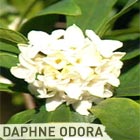Peter Valder looked at some of the ancient myths associated with plant names
Daphne
Greek myth: Daphne, the beautiful daughter of a river god and a goddess of the earth, was relentlessly pursued by the sun god, Apollo. Just as Apollo was about to grab Daphne, her parents took pity on her and changed her into a bay tree.
Shrub: Daphne (Daphne odora) is one of the best shrubs for flowering in winter. It has a wonderful scent, grows in a wide range of climates and usually looks its best in partial shade.
Hyacinth
Greek myth: Apollo, the sun god, and Zephyrus, god of the West Wind, were both in love with Hyacinthus, a handsome Spartan youth. One day Apollo was teaching Hyacinthus how to throw the discus. Zephyrus was jealous and blew the discus off course. It struck Hyacinthus in the head and killed him. A plant that now bears his name sprang up from the spot on the ground where his blood fell.
Bulb: Hyacinths (Hyacinthus orientalis) have long been favourite spring flowering plants, with their delicious scent and wide range of colours. They came originally from the Middle East and do best in cool climates.
Narcissus
Greek myth: Narcissus was promised a long life if he did not look at his own image. However, he saw his reflection in a pool and remained there admiring himself until he pined away. The flower that bears his name supposedly grew on the spot where he died.
Bulb: Most Narcissus come from the Mediterranean and Middle East. They prefer cool climates, although jonquils seem also to grow well where the winters are milder.
Further information
Gardens in China by Peter Valder, published by Florilegium (ISBN 1876314133). RRP: $90.
Wisterias, A Comprehensive Guide, by Peter Valder, published by Florilegium (ISBN 0646220497). RRP: $49.50.



